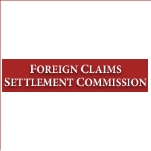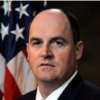An independent agency within the Department of Justice, FCSC has been settling claims U.S. Nationals have against foreign governments since 1954.
FCSC was established as a result of the Reorganization Plan No. 1 of 1954, through which President Eisenhower transferred the functions of the War Claims Commission and International Claims Commission to FCSC. The War Claims Commission had been created as a temporary agency by the War Claims Act of 1948, to settle claims of former U.S. World War II prisoners of war and civilian internees captured, or in hiding to avoid capture, in places like the Philippines, and, in the case of prisoners of war, in Germany and other Axis countries.
From 1949 to April 1, 1954, approximately $134 million was paid to claimants as a result of determinations by the War Claims Commission. The International Claims Commission, established within the Department of the State by the International Claims Settlement Act of 1949, was at first just responsible for adjudicating claims involving the Yugoslav government. But it was authorized to also handle future similar claims between the U.S. and other foreign governments, and from 1950 to April 1, 1954 it settled 531 various claims. In total, the three commissions together have adjudicated more than 660,000 claims, with awards amounting to billions of dollars.
- Table of Contents
- Overview
- History
- What it Does
- Where Does the Money Go
- Controversies
- Suggested Reforms
- Comments
- Leave a comment


Anuj Chang Desai was confirmed by the U.S. Senate as commissioner of the Foreign Claims Settlement Commission on March 30, 2012. The Commission adjudicates claims of U.S. nationals against foreign governments.
Desai earned an A.B. in mathematics from Harvard University in 1987, a master’s degree in international affairs from Columbia University in 1990, and a J.D. from the school of law at the University of California, Berkeley, in 1994, where he served as editor-in-chief of the California Law Review.
Desai spent the summers of his school years gaining on-the-job experience. In 1990, he landed work a position as an instructor at the John F. Kennedy School of Government at Harvard. Then in 1992, he did some work at the Legal Resources Centre in Grahamstown, South Africa. In the summer of 1993, he took on a job as a law clerk in the Legal Adviser’s Office at the U.S. Department of State, and the following summer was as an associate with the law firm of Hogan and Hartson.
Between 1994 and 1996, with his college years now behind him, Desai served as a judicial clerk for Judge David S. Tatel at the United States Court of Appeals for the D.C. Circuit and for Judge Louis F. Oberdorfer at the United States District Court for the District of Columbia.
In 1996, Desai was recruited as a legal assistant to the U.S. arbitrators at the Iran-United States Claims Tribunal in The Hague, The Netherlands, a job that continued through 1998. Later that year he went on to practice law with the Seattle firm of Davis Wright Tremaine, focusing on litigation pertaining to copyright, trademark, newsgathering and the First Amendment. Then in 2001, he joined the University of Wisconsin Law School faculty as a professor of law. With periodic leaves of absence, he has continued in that job to the present. As a visiting professor, he taught at the Johns Hopkins University-Nanjing University Center for Chinese and American Studies in Nanjing, China; National Taiwan University in Taipei, Taiwan; and National Tsing Hua University in Hsinchu, Taiwan.
In January, 2016, Desai was appointed as a member of the U.S. Department of Labor’s Administrative Review Board, which issues final decisions for the Secretary of Labor in cases relating to worker protection laws.
Among his many publications and presentations are Wiretapping Before the Wires: The Post Office and the Birth of Communication Privacy, What a History of Tax Withholding Tells Us about the Relationship between Statutes and Constitutional Law and Can the President Read Your Mail?: A Legal Analysis.
-Danny Biederman
To Learn More:

Fresh off his election victory, President Barack Obama has opted for continuity in the leadership of a little-known independent agency within the Department of Justice that settles claims that Americans have against foreign governments. On November 15, Obama nominated Timothy J. Feighery to continue serving as Chairman of the Foreign Claims Settlement Commission (FCSC), a position he has held since March 21, 2011. Feighery, who succeeded Rafael Martinez, saw his term expire on September 30.
Born in 1962 in the Bronx, New York, Feighery earned a B.A. in Philosophy in 1984 and a J.D. in 1987, both from Fordham University. During law school he also worked at a family-owned bar/restaurant in Carmel, N.Y., from 1984 to 1986. After graduating law school and passing the New York bar exam, Feighery practiced law as an associate at Kaye Scholer, LLP in New York, Brussels, Belgium, and Washington, D.C., from May 1986 to December 1995.
Feighery left private practice for public service as a team leader at the United Nations Compensation Commission in Geneva, Switzerland, established to address claims arising out of Iraq’s 1990 invasion and occupation of Kuwait. He served as a team leader from February 1996 to July 1998, and later returned to serve as chief of section of the Legal Services Branch from January 2000 to August 2003. In between his two stints in Geneva, Feighery served as a senior attorney in the Bureau of Competition at the Federal Trade Commission, where he worked from August 1998 to December 1999.
Upon his return from Geneva, from August 2003 to July 2004 Feighery was a deputy special master for the Justice Department’s September 11, 2001, Victim Compensation Fund, where he was responsible for assessing claims made by victims of the 9/11 attacks. From July 2004 until his 2011 appointment to the FCSC, Feighery served as an attorney adviser in the Office of the Legal Adviser at the State Department, where he represented U.S. interests in international arbitration and foreign investment disputes.
Feighery served as co-vice chair of the American Bar Association Committee on International Courts from 2008 to 2010. He taught International Law and European Union Law as an adjunct professor at the George Mason University School of Law from August 2005 to May 2010, and taught Business Law at Webster University in Geneva, Switzerland, in 1997.
Feighery and his wife Sarah have three children: Finn, Teddy and Anne. He contributed $250 to Barack Obama’s 2008 presidential campaign.
-Matt Bewig
- Latest News
- D.C. Public Schools will Teach all Second-Graders to Ride a Bike
- New Rule in Germany Limits Sales of Sex-Themed E-Books to 10pm to 6am
- What Happened to the 6-Year-Old Tibetan Boy the Chinese Government Kidnapped 20 Years Ago?
- U.S. Ambassador to Turkey Photoshops his Hair Color to Mock Turkish Mayor
- Mystery Artist Calls Attention to Unfixed Potholes by Drawing Penises around Them
An independent agency within the Department of Justice, FCSC has been settling claims U.S. Nationals have against foreign governments since 1954.
FCSC was established as a result of the Reorganization Plan No. 1 of 1954, through which President Eisenhower transferred the functions of the War Claims Commission and International Claims Commission to FCSC. The War Claims Commission had been created as a temporary agency by the War Claims Act of 1948, to settle claims of former U.S. World War II prisoners of war and civilian internees captured, or in hiding to avoid capture, in places like the Philippines, and, in the case of prisoners of war, in Germany and other Axis countries.
From 1949 to April 1, 1954, approximately $134 million was paid to claimants as a result of determinations by the War Claims Commission. The International Claims Commission, established within the Department of the State by the International Claims Settlement Act of 1949, was at first just responsible for adjudicating claims involving the Yugoslav government. But it was authorized to also handle future similar claims between the U.S. and other foreign governments, and from 1950 to April 1, 1954 it settled 531 various claims. In total, the three commissions together have adjudicated more than 660,000 claims, with awards amounting to billions of dollars.
Comments


Anuj Chang Desai was confirmed by the U.S. Senate as commissioner of the Foreign Claims Settlement Commission on March 30, 2012. The Commission adjudicates claims of U.S. nationals against foreign governments.
Desai earned an A.B. in mathematics from Harvard University in 1987, a master’s degree in international affairs from Columbia University in 1990, and a J.D. from the school of law at the University of California, Berkeley, in 1994, where he served as editor-in-chief of the California Law Review.
Desai spent the summers of his school years gaining on-the-job experience. In 1990, he landed work a position as an instructor at the John F. Kennedy School of Government at Harvard. Then in 1992, he did some work at the Legal Resources Centre in Grahamstown, South Africa. In the summer of 1993, he took on a job as a law clerk in the Legal Adviser’s Office at the U.S. Department of State, and the following summer was as an associate with the law firm of Hogan and Hartson.
Between 1994 and 1996, with his college years now behind him, Desai served as a judicial clerk for Judge David S. Tatel at the United States Court of Appeals for the D.C. Circuit and for Judge Louis F. Oberdorfer at the United States District Court for the District of Columbia.
In 1996, Desai was recruited as a legal assistant to the U.S. arbitrators at the Iran-United States Claims Tribunal in The Hague, The Netherlands, a job that continued through 1998. Later that year he went on to practice law with the Seattle firm of Davis Wright Tremaine, focusing on litigation pertaining to copyright, trademark, newsgathering and the First Amendment. Then in 2001, he joined the University of Wisconsin Law School faculty as a professor of law. With periodic leaves of absence, he has continued in that job to the present. As a visiting professor, he taught at the Johns Hopkins University-Nanjing University Center for Chinese and American Studies in Nanjing, China; National Taiwan University in Taipei, Taiwan; and National Tsing Hua University in Hsinchu, Taiwan.
In January, 2016, Desai was appointed as a member of the U.S. Department of Labor’s Administrative Review Board, which issues final decisions for the Secretary of Labor in cases relating to worker protection laws.
Among his many publications and presentations are Wiretapping Before the Wires: The Post Office and the Birth of Communication Privacy, What a History of Tax Withholding Tells Us about the Relationship between Statutes and Constitutional Law and Can the President Read Your Mail?: A Legal Analysis.
-Danny Biederman
To Learn More:

Fresh off his election victory, President Barack Obama has opted for continuity in the leadership of a little-known independent agency within the Department of Justice that settles claims that Americans have against foreign governments. On November 15, Obama nominated Timothy J. Feighery to continue serving as Chairman of the Foreign Claims Settlement Commission (FCSC), a position he has held since March 21, 2011. Feighery, who succeeded Rafael Martinez, saw his term expire on September 30.
Born in 1962 in the Bronx, New York, Feighery earned a B.A. in Philosophy in 1984 and a J.D. in 1987, both from Fordham University. During law school he also worked at a family-owned bar/restaurant in Carmel, N.Y., from 1984 to 1986. After graduating law school and passing the New York bar exam, Feighery practiced law as an associate at Kaye Scholer, LLP in New York, Brussels, Belgium, and Washington, D.C., from May 1986 to December 1995.
Feighery left private practice for public service as a team leader at the United Nations Compensation Commission in Geneva, Switzerland, established to address claims arising out of Iraq’s 1990 invasion and occupation of Kuwait. He served as a team leader from February 1996 to July 1998, and later returned to serve as chief of section of the Legal Services Branch from January 2000 to August 2003. In between his two stints in Geneva, Feighery served as a senior attorney in the Bureau of Competition at the Federal Trade Commission, where he worked from August 1998 to December 1999.
Upon his return from Geneva, from August 2003 to July 2004 Feighery was a deputy special master for the Justice Department’s September 11, 2001, Victim Compensation Fund, where he was responsible for assessing claims made by victims of the 9/11 attacks. From July 2004 until his 2011 appointment to the FCSC, Feighery served as an attorney adviser in the Office of the Legal Adviser at the State Department, where he represented U.S. interests in international arbitration and foreign investment disputes.
Feighery served as co-vice chair of the American Bar Association Committee on International Courts from 2008 to 2010. He taught International Law and European Union Law as an adjunct professor at the George Mason University School of Law from August 2005 to May 2010, and taught Business Law at Webster University in Geneva, Switzerland, in 1997.
Feighery and his wife Sarah have three children: Finn, Teddy and Anne. He contributed $250 to Barack Obama’s 2008 presidential campaign.
-Matt Bewig
- Latest News
- D.C. Public Schools will Teach all Second-Graders to Ride a Bike
- New Rule in Germany Limits Sales of Sex-Themed E-Books to 10pm to 6am
- What Happened to the 6-Year-Old Tibetan Boy the Chinese Government Kidnapped 20 Years Ago?
- U.S. Ambassador to Turkey Photoshops his Hair Color to Mock Turkish Mayor
- Mystery Artist Calls Attention to Unfixed Potholes by Drawing Penises around Them





Comments